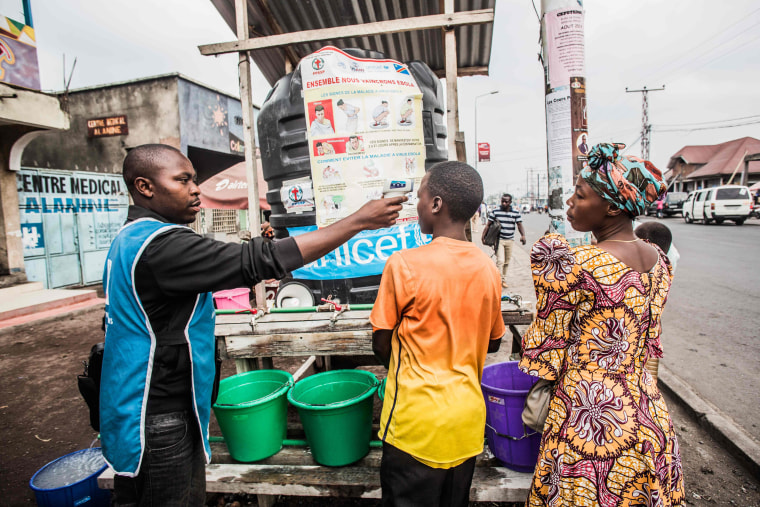Ongoing violence, community resistance and mistrust of health care workers are hampering efforts by the U.S. government to send a robust team of experts to the Democratic Republic of Congo to assist in the Ebola outbreak that has now been raging for a year.
The Centers for Disease Control and Prevention has just 12 staff members in Goma, one of the Congo's most densely populated cities, just south of the epicenter of the outbreak.
In contrast, the CDC sent hundreds of workers to West Africa during the 2014 Ebola outbreak.
"We're anxious to get on the ground in the outbreak areas, but there are security concerns," Dr. Henry Walke, director of the CDC's division of preparedness and emerging infections, told reporters on a conference call Thursday.
Indeed, there are major obstacles to controlling this outbreak: political and economic instability, as well as armed militia groups that have attacked hundreds of health care workers and patients since January.
The outbreak in Congo was declared one year ago, and has become the second deadliest on record, with more than 1,800 deaths and roughly 2,700 cases. There is no evidence the outbreak is slowing.
Walke said the CDC plans to double the number of staff in Congo over the next month, but is watching the security situation closely. Some CDC staffers have been deployed to the World Health Organization headquarters in Geneva, and others are stationed at the CDC's emergency operations center in Atlanta.
Officials said that the risk of the outbreak spreading to the U.S. is quite low. Fewer than 16,000 people travel from the Democratic Republic of Congo to the U.S. each year, and there are no direct flights, Walke said.
"The best way to keep Americans safe at home is to contain the outbreak" in Congo, he added.
Two recent cases reported in Goma — home to 2 million people near the border of Rwanda — have concerned public health officials. CDC officials said one of the individuals became ill and stayed at home with family members for treatment. That patient later died at an Ebola treatment center. A relative has since fallen ill.
"The population in Goma is highly mobile, so this is an event we have anticipated," wrote WHO Director-General Dr. Tedros Adhanom Ghebreyesus on Twitter. "This is why we have been doing intensive preparedness work in Goma so that any new case is identified and responded to immediately."
Goma sits on the border with Rwanda, which briefly closed its border with Congo on Thursday. It was later reopened after protests.
"Keeping borders open is so important in disease control," said Lauren Sauer, director of operations for the Johns Hopkins Office of Critical Event Preparedness and Response. Tens of thousands of people cross the border between Congo and Rwanda every day.
When borders are closed, Sauer explained, "people find other ways to move that we don't understand and don't know about."
On July 17, the WHO declared the outbreak a "public health emergency of international concern" in an effort to boost international response and funding. But the group specifically advised against any travel and trade restrictions related to Congo.
Such restrictions can drastically affect the culture in Congo, Sauer said.
"It affects trust. It affects every day life and livelihood," she told NBC News. "It makes it all the more important to be culturally sensitive and appropriate in the way you handle public health measures."
The Ebola virus is spread through contact with blood and other bodily fluids. Doctors use supportive fluids and electrolytes to help counter the side effects of high fever, vomiting and diarrhea. There is no cure, but an Ebola vaccine is now being used to help control the spread of the disease.
Follow NBC HEALTH on Twitter & Facebook.



